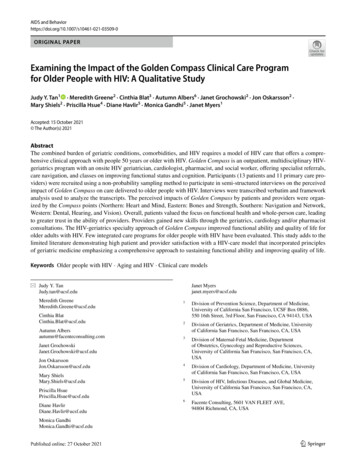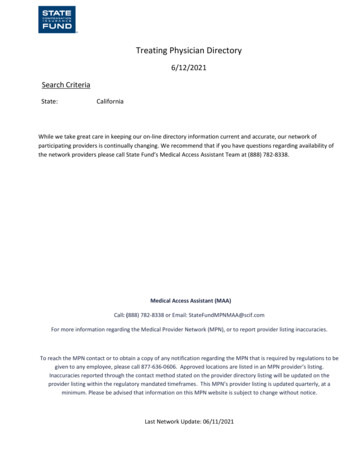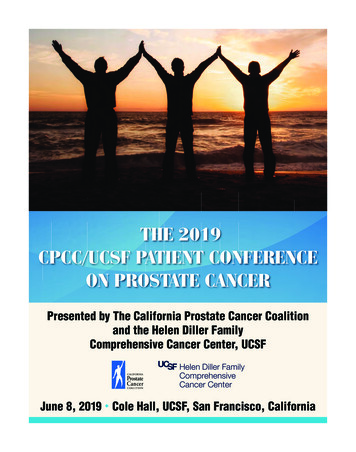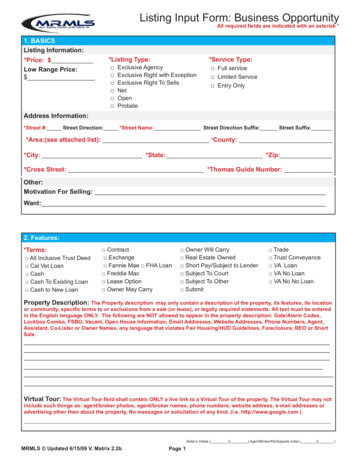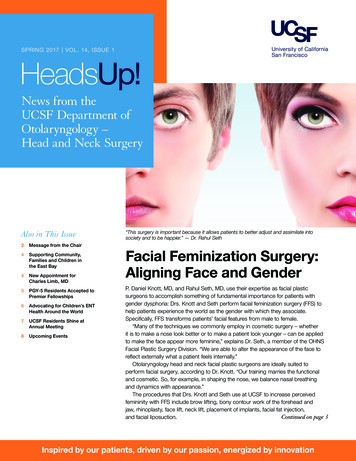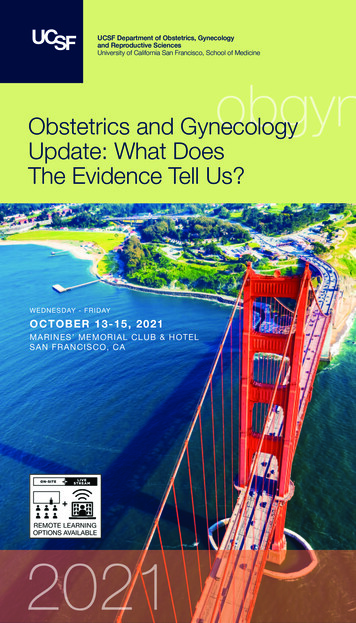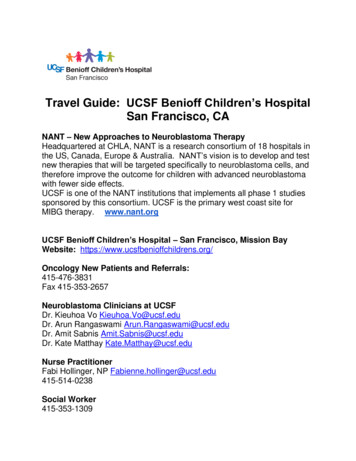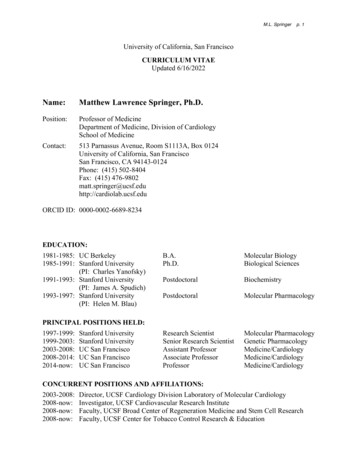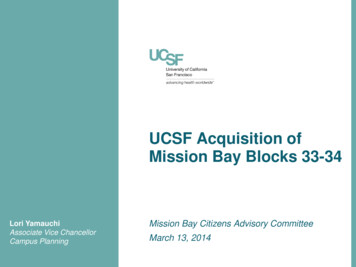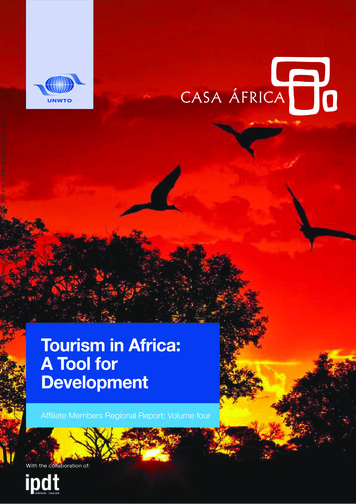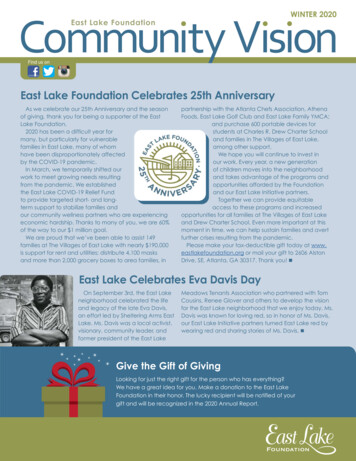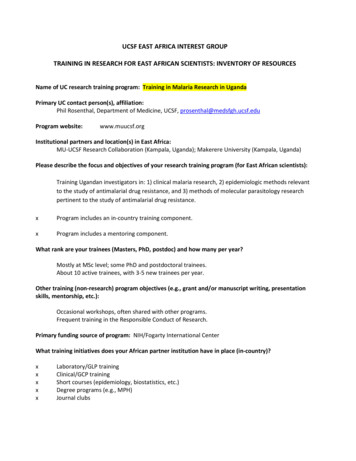
Transcription
UCSF EAST AFRICA INTEREST GROUPTRAINING IN RESEARCH FOR EAST AFRICAN SCIENTISTS: INVENTORY OF RESOURCESName of UC research training program: Training in Malaria Research in UgandaPrimary UC contact person(s), affiliation:Phil Rosenthal, Department of Medicine, UCSF, prosenthal@medsfgh.ucsf.eduProgram website:www.muucsf.orgInstitutional partners and location(s) in East Africa:MU-UCSF Research Collaboration (Kampala, Uganda); Makerere University (Kampala, Uganda)Please describe the focus and objectives of your research training program (for East African scientists):Training Ugandan investigators in: 1) clinical malaria research, 2) epidemiologic methods relevantto the study of antimalarial drug resistance, and 3) methods of molecular parasitology researchpertinent to the study of antimalarial drug resistance.xProgram includes an in-country training component.xProgram includes a mentoring component.What rank are your trainees (Masters, PhD, postdoc) and how many per year?Mostly at MSc level; some PhD and postdoctoral trainees.About 10 active trainees, with 3-5 new trainees per year.Other training (non-research) program objectives (e.g., grant and/or manuscript writing, presentationskills, mentorship, etc.):Occasional workshops, often shared with other programs.Frequent training in the Responsible Conduct of Research.Primary funding source of program: NIH/Fogarty International CenterWhat training initiatives does your African partner institution have in place (in-country)?xxxxxLaboratory/GLP trainingClinical/GCP trainingShort courses (epidemiology, biostatistics, etc.)Degree programs (e.g., MPH)Journal clubs
Name of UC-affiliated research training program:Uganda Malaria Clinical, Operational and Health Services Research (COHRE) Training ProgramPrimary UC contact person(s), affiliation:Grant Dorsey, Department of Medicine, UCSF, gdorsey@medsfgh.ucsf.edu[PI: Moses Kamya, Makerere University (Uganda), mkamya@infocom.co.ug]Program website:www.muucsf.orgInstitutional partners and location(s) in East Africa:MU-UCSF Research Collaboration (Kampala, Uganda); Makerere University (Kampala, Uganda)Please describe the focus and objectives of your research training program (for East African scientists):Aims: 1) substantially increase the expertise of our trainees in relevant clinical, epidemiological,operational and health services research, 2) strengthen the sustainability of malaria research atMakerere University by integrating malaria research into on-going capacity building programs, 3)promote collaborations between academic/research institutions in Uganda and those in Europeand the US, 4) strengthen trainee contributions to evidence-based decision-making related tomalaria control (in particular through interactions with the Uganda Ministry of Health), 5) optimizetraining through utilization of additional available resources in Uganda (including projects fundedby the NIH, CDC, and President’s Malaria Initiative (PMI), and 6) strengthen research capacity inUganda by helping trainees to integrate into Ugandan institutions and pursue independentlysupported scientific careers.xxProgram includes an in-country training componentProgram include a mentoring componentWhat rank are your trainees (Masters, PhD, postdoc) and how many per year?Mostly MSc, Some PhD training; 5 per yearOther training (non-research) program objectives (e.g., grant and/or manuscript writing, presentationskills, mentorship, etc.):Workshops in the Responsible Conduct of Research and other topicsPrimary funding source of program:NIH/Fogarty International Center
What training initiatives does your African partner institution have in place (in-country)?xxxxLaboratory/GLP trainingClinical/GCP trainingShort courses (epidemiology, biostatistics, etc.)Degree programs (e.g., MPH)Journal clubs
Name of UC research training program: Training in Clinical Research (TICR) ProgramPrimary UC contact person(s), affiliation:Jeff Martin, UCSF, Martin@psg.ucsf.eduProgram t.htmlInstitutional partners and location(s) in East Africa: Any interested institutionPlease describe the focus and objectives of your research training program (for East African scientists):The overall mission of the UCSF Training in Clinical Research (TICR) Program is to increase thenumber and quality of clinical investigators. This is achieved by offering a broad array ofeducational opportunities in the methods of clinical research to meet the diverse needs oftrainees, faculty and staff at UCSF and its outside partners.Program includes an in-country training componentxProgram includes a mentoring componentWhat rank are your trainees (Masters, PhD, postdoc) and how many per year?1-year Certificate Program (25)2-year Master’s Program (25)Other training (non-research) program objectives (e.g., grant and/or manuscript writing, presentationskills, mentorship, etc.):Scientific presentation, grantwriting, and other professional skills are included.Primary funding source of program:Student feesWhat training initiatives does your African partner institution have in place (in-country)?Laboratory/GLP trainingClinical/GCP trainingShort courses (epidemiology, biostatistics, etc.)Degree programs (e.g., MPH)Journal clubsOtherNone
Name of UC research training program: Training in HIV-Associated MalignanciesPrimary UC contact person(s), affiliation:Jeff Martin, UCSF, Martin@psg.ucsf.eduProgram website:Institutional partners and location(s) in East Africa: Infectious Diseases Institute (Kampala, Uganda)Please describe the focus and objectives of your research training program (for East African scientists):Comprehensive training in the methods of clinical and epidemiologic research, with applicationtowards the investigation of HIV-associated malignancies in East Africa.xProgram includes an in-country training componentxProgram includes a mentoring componentWhat rank are your trainees (Masters, PhD, postdoc) and how many per year?4 Master’s LevelOther training (non-research) program objectives (e.g., grant and/or manuscript writing, presentationskills, mentorship, etc.):Scholars complete a two-year Master’s Degree Program in the Training in Clinical Research (TICR)Program at UCSF.Primary funding source of program:National Cancer Institute (D43)What training initiatives does your African partner institution have in place (in-country)?xxxLaboratory/GLP trainingClinical/GCP trainingShort courses (epidemiology, biostatistics, etc.)Degree programs (e.g., MPH)Journal clubsOtherNone
Name of UC research training program: Basic and Translational Science CapacityPrimary UC contact person(s), affiliation:Stefanie Sowinski, PhD; Director of Translational Research Laboratory at IDI, Postdoctoral Fellow inWarner Greene’s laboratory, stefanie.sowinski@gladstone.ucsf.eduProgram website:in developmentInstitutional partners and location(s) in East Africa:Infectious Diseases Institute, College of Health Sciences, Makerere University’s Mulago HospitalComplex (Kampala, Uganda), Email: office@idi.co.ugPlease describe the focus and objectives of your research training program (for East African scientists):Building bench-based Basic and Translational Science CapacityxProgram includes an in-country training componentxProgram includes a mentoring componentWhat rank are your trainees (Masters, PhD, postdoc) and how many per year?In 2012: 1 postdoc, 4 PhD students and 2 Master studentsOther training (non-research) program objectives (e.g., grant and/or manuscript writing, presentationskills, mentorship, etc.):As a senior scientist in the Translational Lab, I provide help with project related scientificdifficulties as well as with grant and/or manuscript writing and presentation skills.Primary funding source of program:Collaborations with Northern Institutions (CFAR, NIH, EU)What training initiatives does your African partner institution have in place (in-country)?xxxxxLaboratory/GLP trainingClinical/GCP trainingShort courses (epidemiology, biostatistics, etc.)Degree programs (e.g., MPH)Journal clubsOther issues?Funding for training positions (e.g. Master or PhD) only possible through collaboration withNorthern institutions. No core funding from IDI itself.
Name of UC research training program:International Traineeships in AIDS Prevention Studies Program (ITAPS)Primary UC contact person(s), affiliation:Jeffrey S. Mandel, PhD, MPH, Institute for Global Health/UCSF, jmandel@psg.ucsf.eduDebbie Brickley, DrPH, Institute for Global Health/UCSF, dbain@psg.ucsf.eduProgram courses-at-ucsf/itapsInstitutional partners and location(s) in East Africa:Please see attached table of ITAPS alumni, their affiliations, and projects they worked on.Please describe the focus and objectives of your research training program (for East African scientists):Non-degree intensive workshops in research methods/protocol development (modeled on TICR)and scientific manuscript preparation. Trainees design a pilot research protocol forimplementation in their home country. Upon completion of data collection, trainees may attend acourse in scientific writing to complete data analysis and prepare a manuscript for submission tothe peer-reviewed literature. We have begun to implement a blended learning program withindividual mentoring by UCSF faculty whereby selected didactic materials are offered throughdistance-learning modules. This enables faculty to devote themselves to individual mentoring oftrainees, and requires shorter periods of time at UCSF to polish protocols or scientific manuscripts.xProgram includes an in-country training componentxProgram includes a mentoring componentWhat rank are your trainees (Masters, PhD, postdoc) and how many per year?MDs, PhD, MPH, or terminal degree in their discipline.Other training (non-research) program objectives (e.g., grant and/or manuscript writing, presentationskills, mentorship, etc.):Primary funding source of program: NIMH (R25), Fogarty AITRP, private funding
What training initiatives does your African partner institution have in place (in-country)?xLaboratory/GLP trainingClinical/GCP trainingShort courses (epidemiology, biostatistics, etc.)Degree programs (e.g., MPH)Journal clubsOther: Short courses and degree programs are under development at some partner institutions.None
ITAPS Program Alumni From East AfricaYear AttendedITAPS Scholar1990Hailegnaw Eshete,MPH2009Manuel KassayeSebhatu, MD1990Gabriel Mbugua, MD,MPH1993,1996Solomon Nzyuko, MA2009, 2010Current AffiliationETHIOPIASr. Health Advisor andConsultant, POLICY project ofEthiopiaDirector forHIV/AIDS/OpportunisticInfection Care and TreatmentProgram, ITECH - affiliate ofUCSF and University ofSeattle (Addis Ababa)KENYAChief Research Officer,Director Center ofMicrobiology, KEMRI(Nairobi)ITAPS ProjectEvaluation of AIDSprevention in EthiopiaDetermine the magnitudeof adherence to treatmentamong adult HIV patientsinitiated on antiretroviralmedicationEpidemiology of HIVinfection among longdistance truck drivers inKenyaLecturer & DevelopmentConsultant at DaystarUniversityAdolescent high risksexual behavior alongthe Trans-AfricanHighway in KenyaMaricianah Onono,MBChBKEMRI Research Officer,Nyanza Research Coordinator(Kisumu)2013Mamo Umuro Abudo,MSc, PhD2013Charles Karue Kibaara,MAManager, National HIVReference Laboratory,Kenyan Ministry of PublicHealth and Sanitation(Nairobi)Deputy Director InformationSystems, KEMRI-UCSF FACESProgram (Nairobi)Examining the effects ofwomen’s HIV/AIDSknowledge, attitudes andtesting status on theirinfant feeding intentionsand practicesEvaluation of a nationalproficiency testing programfor rapid HIV testing inKenya2013Zachary Arochi Kwena,MASocial Scientist, KenyaMedical Research Institute(Nairobi)2013Josephine BeatriceOdoyo, MAStudy Coordinator, KenyaMedical Research InstituteDetermine whethertreatment buddy (Tby) wasassociated with improvedappointment adherencePrevalence and risk factorsfor sexual concurrencyamong fishermen and theirspousesKnowledge of andpreference for
(Nairobi)2013Kathleen Chelang'atRono, MD, MPHInvestigator, Kenya(USAMRU-K)/Walter ReedHIV Project (WRP) Kericho(Nairobi)Medical Epidemiologist,Machako County(Nairobi)2013Joyce Nieri Wamicwe,MD, MSc2013Anthony Kabui Waruru,MA, MphilSurveillance Epidemiologist,CDC (Nairobi)2013Antoine Serufilira, MDRWANDARegional Maternal & ChildHealth Advisor, WHO, Gabon2009Felix Ndagije, MD, MSc1997Gloria Sangiwa, MD1999Japhet Killewo,MBCHB, DPH, MSc,PhDAssoc Prof of Epidemiology,Muhimbili University ofHealth and Allied Sciences(MUHAS) (Dar es Salaam)2006Sally Mtenga, BSSocial Researcher, IfakaraHealth Research &Development Center2009,2007Lusajo Joel Kajula,MphilAssistant lecturer, MuhimbiliUniversity of Health andAllied Sciences (MUHAS) (Dares Salaam)Prevention Team Lead andEpidemiologist, CDC-GAPTANZANIASr. Tech Advisor for HIV/AIDScare and treatment for FHI,Washington, DCcontraceptives forparticipants in PartnersPrEPDescribe clinical eventsduring acute HIV infectionwindow in a multicenternon-randomized cohortPredictors of HIVAntiretroviral TreatmentFailure among PatientsAttending a Semi - UrbanHIV Clinic – Kenya, 2012Predictors of viral loadsuppression among HIVinfected adult patients inNyanza ProvinceMaternal HIV infection as arisk factor for adverseobstetrical outcomesTransmission rates anddisclosure in HIV discordantcouples identified inPMTCT Program in Rwandain 2008The role of voluntarycounseling and testing inHIV/AIDS prevention andcare in Dar es Salaam,Tanzania: Clients’perspectivesHIV-related sex behaviorand its socio-demographiccorrelates in a communitysample of Dar es Salaam,TanzaniaCommunity performinggroups as a possible tool toimprove the uptake ofVoluntary Counseling andTesting for HIV/AIDS inSouthern TanzaniaDepression in school basedDar es Salaam adolescentsand associated risky sexualbehavior
2009Aliaa Bilal, MD, MPH1988Edward KatongoleMbidde, MBChB,MMed, MRCPWarren Naamara,MBChB, MPH,19891990Joseph Konde-Lule,MBChB, MPH1992Moses Kamya, MBChB,Mmed, MPH, PhD1994Gladys Baingana, MD1994Margaret Mungherera,MD1997Agnes Ssali, BA2000, 2003,2005Phoebe Kajubi, MASUDANHead of Planning/trainingand capacity building unit,Sudan National AIDS ControlProgram. Head of PMTCT,Sudan Ministry of Health Sudan National HIV/AIDSControl Program (SNAP)UGANDADirector, Uganda VirusResearch Institute (Entebbe)Deputy Director, AIDSControl Program, Ministry ofHealthSenior Lecturer, Institute ofPublic Health, MakerereUniversity College of HealthSciences (Kampala)Professor, Department Chair,Makerere University,Department of Medicine(Kampala)DeceasedPsychiatrist/Prof. College ofHealth Sciences, MakerereUniversity. President, UgandaMedical Association(Kampala)Head, Monitoring &Evaluation MSF/TASO project(Kampala)Social Scientist/Researcher,Makerere University Collegeof Health Sciences (Kampala)Stigma among womenliving with HIV/AIDS inSudanHeterosexual transmissionof HIV infection in UgandaThe relationship betweenpregnancy and HIVinfectionAssessment of the rate ofprogression of HIVinfection in a Ugandancohort during 5 years offollow-upCondom beliefs and useamong young adult malesin an urban parish ofKampala, UgandaEducation and preventionfor wives of Ugandan AIDSpatientsHIV testing and counselingpractices of hospital basedhealth care workers inUgandaSenior Scientific Officer,Social Sciences in theMicrobicide developmentprogram of MedicalResearch Council Unit onAIDS Research2000: Impact of condomtechnical skills workshopson condom acquisition anduse by men in Kampala,Uganda2003: A rapid assessmentof social factors, sexualactivity and HIV riskbehavior in a sample of
2002,2006Charles Ssali, BDS, MSCSenior Dental Surgeon,Ministry of Health (Kampala)2006Alice Namale, MBChB,M.Med, DTMPHMedical Epidemiologist/CDCUganda, Uganda VirusResearch Institute (Entebbe)2008Isaac Kigozi, MBChB,MScStudy Coordinator MbararaMUST-Harvard ResearchCollaboration (Mbarara)2008Ivy Kasirye, MBBS,MMedPediatrician, MildmayTreatment and TrainingCenter2009Steven Baveewo, MD,MScStudy Coordinator, MU-UCLAResearch Collaboration,Makerere University Collegeof Health Sciences (Kampala)2010Rose Baryamutuma,MAResearcher, Makerere Schoolof Public Health (Kampala)2010Mary Dutki,MAResearcher,Makerere University Schoolof Public Health (Kampala)2009, 2011Winnie Muyindike, MD,MMedDeputy Director (Finance andAdministration) MbararaRegional Referral Hospital(Mbarara)gay/bisexual men inKampala, UgandaPrevalence of neonatal oralthrush among infants bornto HIV seropositivemothers in UgandaPrevalence and risk factorsfor transmission of HHV8among children in a ruralUgandan communityPredictors of ARTadherence, clinicalimprovement, andregularity of clinicattendance among HIVpositive clinicEvaluation of theeffectiveness ofFlucanazole primaryprophylaxis in theprevention of cryptococcalmeningitis in HIV-1 infectedUgandan adolescents andadults with CD4 counts,100 cells and therelationship of thisoutcome to CD4 countsBarriers to HIV disclosureto sexual partners among acohort of newly diagnosedHIV patients in MulagohospitalAssessing the utilizatin ofblood and blood productswithin health facilities inUgandaEvaluation of thecounseling program at theAIDS information center,UgandaThe uptake of familyplanning methods byclients in the ISS clinic andconception rates for HIVpositive females indifferent clinical andimmunological stages
2011Charity KyomugishaNuwagaba, MAM&E Technical AdviserMakerere University, Schoolof Public Health METAProject (Kampala)2011Alfred Okiria, MD, MPH2012Ponsiano Ocama, MD,PhDPublic Health Specialist andMUSPH-CDC HIV/AIDSFellow, Makerere UniversityCollege of Health Sciences,(Kampala)Senior Lecturer, Departmentof Medicine, MakerereUniversity (Kampala)2013Gershim Asiki, MD,MScProject Leader, Uganda VirusResearch Institute(Entebbe)2013Aliba Flavia Luwedde,MDStudy Coordinator Infectious Disease ResearchCollaboration(Tororo)2013William Gabriel KofiMassavon, MD, MPHProject Manager of Children'sHIV Programme / ResearchCoordinatorHome Care Department,Nsambaya Hospital(Kampala)Prevalence and Predictorsof HIV – AssociatedNuerocognitive Disorders(HAND) among HIV PositiveAdults in UgandaReferal of HIV positiveindividuals to healthfacilities following homebased counseling andtesting in Apac districtHepatitis B viral infection ishighly prevalent inNorthern Ugandan: resultsof a population-basedsurvey in Gulu municipalityWillingness to participatein HIV vaccine trials amonghigh risk men and womenfrom fishing communitiesaround Lake Victoria inUgandaHome versus hospital childbirths among HIV infectedpregnant women oncombination antiretroviraltherapy and birthoutcomes. A randomizedcontrolled trialRetention and mortalityamong HIV-infectedchildren and adolescents ina Community Home-BasedCare and a Facility-basedFamily-Centred Approachin Kampala, Uganda: adescriptive study
Name of UC research training program: GloCal Health FellowshipPrimary UC contact person(s), affiliation:Craig Cohen (PI), UCSF Global Health Sciences and Bixby Center, ccohen@globalhealth.ucsf.eduKimberly Bale (Coordinator), balek@globalhealth.ucsf.eduProgram website:www.glocalfellows.orgInstitutional partners and location(s) in East Africa:Kenya: Kenya Medical Research InstituteUganda: Makerere University; Infectious Diseases Institute; Mbarara University of Science andTechnologyPlease describe the focus and objectives of your research training program (for East African scientists):The purpose of the program is to support an 11-month, mentored research fellowship for existingand aspiring investigators who are interested in studying diseases and conditions in developingcountries (all trainees must spend 11 consecutive months in-country in order to be eligible for theprogram). Several training sites are available through the UCGHI/international institutionconsortium (African sites include Kenya, Uganda, Zimbabwe, Mozambique, Ethiopia).xProgram includes an in-country training componentxProgram includes a mentoring componentWhat rank are your trainees (Masters, PhD, postdoc) and how many per year?The Fellowship is designed for: doctoral students (PhD, DrPH, etc.), professional students (MD,DDS, DVM, PharmD, etc.), post-doctoral fellows, foreign post-doctoral fellows from participatinginternational sites in low- and middle-income countries (LMICs), and junior faculty with a currentNIH Career Development Award (K series or similar award) whose interests focus oninterdisciplinary research in areas such as: social and behavioral science, nutrition, environment,medicine, public health, nursing, veterinary and basic sciences.Other training (non-research) program objectives (e.g., grant and/or manuscript writing, presentationskills, mentorship, etc.):Accepted doctoral/professional student trainees will spend their first four-week period at UCSFparticipating in the Clinical and Translational Research (CTR) Fellowship, followed by 10 months atthe international research site. All trainees must also attend a mandatory five-day NIH training inWashington, DC at the beginning of their fellowship.Primary funding source of program:NIH/Fogarty International Center
What training initiatives does your African partner institution have in place (in-country)?xxxxxxLaboratory/GLP trainingClinical/GCP trainingShort courses (epidemiology, biostatistics, etc.)Degree programs (e.g., MPH)Journal clubsOtherNoneOther issues?See individual programs at partner institutions.
Name of UC research training program: Global Health Equity Scholars (GHES) FellowshipPrimary UC contact person(s), affiliation:Lee Riley (Program Director), UC Berkeley, lwriley@berkeley.eduMelaine Delcroix (Assistant Director), UC Berkeley, mdelcroix@berkeley.eduProgram website:http://ghes.berkeley.edu/Institutional partners and location(s) in East Africa:Ethiopia: Addis Ababa UniversityKenya: University of Nairobi; Kenya Medical Research Institute (KEMRI)Uganda: Makerere UniversityZimbabwe: University of ZimbabwePlease describe the focus and objectives of your research training program (for East African scientists):The main objective of the program is to generate a new and young cadre of global healthresearchers, educators, and professionals who will be prepared to address new challenges inglobal health related to vulnerable and neglected populations. The program will provide fellowswith interdisciplinary education and training in innovative global health research to promotehealth equity for populations that reside in human settlements defined by United Nations asslums.xProgram includes an in-country training componentxProgram includes a mentoring componentWhat rank are your trainees (Masters, PhD, postdoc) and how many per year?Mostly US postdoctoral fellows and junior facultyOther training (non-research) program objectives (e.g., grant and/or manuscript writing, presentationskills, mentorship, etc.):Grant and manuscript writing; statistics; epidemiological methods; lab-based training; operationresearchPrimary funding source of program:Fogarty International Center, NIHWhat training initiatives does your African partner institution have in place (in-country)?xxxxLaboratory/GLP trainingClinical/GCP trainingShort courses (epidemiology, biostatistics, etc.)Degree programs (e.g., MPH)Journal clubs
Name of UC research training program:UCB-UCSF-MU Research Training on TB and Other Pulmonary Complications of HIVPrimary UC contact person(s), affiliation:Arthur Reingold, UC Berkeley, reingold@berkeley.eduLucian Davis, UCSF, lucian.davis@ucsf.eduProgram website:Institutional partners and location(s) in East Africa:Makerere University and Mulago Hospital (Kampala, Uganda)Please describe the focus and objectives of your research training program (for East African scientists):Mentoring junior faculty at Makerere/Mulago in research on pulmonary complications of HIV, withan emphasis on TB.xProgram includes an in-country training componentxProgram includes a mentoring componentWhat rank are your trainees (Masters, PhD, postdoc) and how many per year?All levels; 6 per yearOther training (non-research) program objectives (e.g., grant and/or manuscript writing, presentationskills, mentorship, etc.):All of the aspects of designing, carrying out, analyzing and writing up/presenting AIDS-relatedresearch.Primary funding source of program:Fogarty International Center, NIHWhat training initiatives does your African partner institution have in place (in-country)?xxxLaboratory/GLP trainingClinical/GCP trainingShort courses (epidemiology, biostatistics, etc.)Degree programs (e.g., MPH)Journal clubsOther: MentoringNone
Name of UC research training program:UC Berkeley-UCSF Joint Medical Program or JMP (and MD/MS program)(based in the UC Berkeley School of Public Health)Primary UC contact person(s), affiliation:Colette (Coco) Auerswald, MD, MS (Director), coco.auerswald@berkeley.edu (as of 7/1/13)Doug Jutte, MD, MPH (Associate Director), dpjutte@berkeley.eduTracey Jones, MA (JMP Student Services Advisor), jmp@berkeley.eduProgram website:http://jmp.berkeley.edu/Institutional partners and location(s) in East Africa:We have had partnerships with the Kenya Medical Research Institute (KEMRI) for projects havingto do with stigma and HIV care access on M’fangano Island (student PI: Annie Chang, MS, current3rd year medical student at UCSF) and regarding HIV prevalence and its determinants (student PI:Ariella Goldblatt, 2nd year medical student at UCB).Professor Auerswald has had an ongoing research project in Kisumu with KEMRI, the Vijana Wetuproject, addressing the social determinants of the health of street children and youth in Kisumu forthe past 6 years. The co-PI for that project has been Elizabeth Bukusi, MD, PhD of KEMRI.Prof. Ndola Prata, the Scientific Director of the UCB Bixby Center for Population Health andSustainability (http://bixby.berkeley.edu/) has conducted research in Tanzania regarding theexpansion of use of misoprostol to control postpartum hemorrhage, the leading cause of maternalmortality worldwide. In addition, she is currently heading a community-based study in Ethiopiainvestigating the efficacy and preferred choice of provider for injectable contraceptives andregarding access to medical abortion.Other students have conducted projects in East Africa in the past outside of these structures, butnone of these are in the field currently.Please describe the focus and objectives of your research training program (for East African scientists):Students in the JMP complete a research project during their three years at the Berkeley School ofPublic Health to fulfill the requirement of a Masters of Science, while concurrently enrolled in theircoursework toward their medical degree at UCSF. Some of these projects have been based in EastAfrica.[Depends]Program includes an in-country training componentxProgram includes a mentoring componentWhat rank are your trainees (Masters, PhD, postdoc) and how many per year?MS students concurrently enrolled in medical school
Other training (non-research) program objectives (e.g., grant and/or manuscript writing, presentationskills, mentorship, etc.):Literature reviewStudy designResearch ethicsGrant writingPresentation (poster, oral)PublicationProject implementation and completion of an MS thesis with a committee of UCB facultyPrimary funding source of program:UCB-UCSF program primarily funded by fees and UC.Research funded by intra-program, intramural and extramural funds.What training initiatives does your African partner institution have in place (in-country)?xxxxxLaboratory/GLP trainingClinical/GCP trainingShort courses (epidemiology, biostatistics, etc.)Degree programs (e.g., MPH)Journal clubsOtherNoneOther issues?KEMRI has all of the above, though students participate as needed, depending on the project.
Name of UC research training program: UCSF GSI Tanzania M&E ProjectsPrimary UC contact person(s), affiliation:Susie Welty, Institute for Global Health/UCSF, swelty@psg.ucsf.eduGeorge Rutherford, Institute for Global Health/UCSF, grutherford@psg.ucsf.eduProgram ntion-public-health-groupInstitutional partners and location(s) in East Africa: Mzumbe University – Mzumbe, Tanzania National AIDS Control Programme – Dar es Salaam, Tanzania Zanzibar AIDS Control Programme – Zanzibar, Tanzania TACAIDS – Dar es Salaam, TanzaniaPlease describe the focus and objectives of your research training program (for East African scientists):We are developing a master’s program in M&E with Mzumbe University. The first class of studentswill start in October of 2013. The objectives of the masters program are to build in-countrycapacity for monitoring and evaluating health programs.xProgram includes an in-country training componentxProgram includes a mentoring componentWhat rank are your trainees (Masters, PhD, postdoc) and how many per year?The masters program is aimed at professionals with at least two years of work experience and acollege degree. The in-service trainings vary from lower level health facility personnel to MDs.Other training (non-research) program objectives (e.g., grant and/or manuscript writing, presentationskills, mentorship, etc.):In addition we do in service trainings on Scientific Writing, Data Analysis, Data Use, Data Quality,Cohort reporting, and Surveillance methods for high risk populations.Primary funding source of program: CDC-Tanzania Cooperative AgreementWhat training initiatives does your African partner institution have in place (in-country)?xxLaboratory/GLP trainingClinical/GCP trainingShort courses (epidemiology, biostatistics, etc.)Degree programs (e.g., MPH)Journal clubsOtherNone
Name of UC research training program: UCSF GSI Scientific Writing WorkshopsPrimary UC contact person(s), affiliation:Joy Mirjahangir, Institute for Global Health/UCSF, jmirjahangir@psg.ucsf.eduG
individual mentoring by UCSF faculty whereby selected didactic materials are offered through distance-learning modules. This enables faculty to devote themselves to individual mentoring of trainees, and requires shorter periods of time at UCSF to polish protocols or scientific manuscripts. x Program includes an in-country training component
